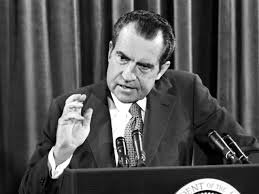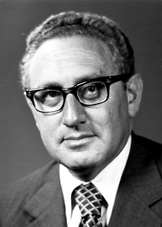Vietnamization
- Anti-war demonstrations became very popular in the US
- President Nixon was elected in 1968 on a peace platform (Tricky Dicky)
- Nixon wanted to find a way out honorably
- Developed Vietnamization with help of Henry Kissinger and Henry Cabot-Lodge
- Make the south well trained enough militarily that they could withstand the north on their own
- Strengthen the south's government to attract a boarder base
- American's began to make their first withdrawals in Aug. 1969
- Air war increased
- B-52s dropped more bombs on North Vietnam than during all of WWII
- 1971 almost entirely an air war
- 1972 200,000 troops
- Jan 1973 a cease fire is signed (Americans got their POWs back after 20yrs of fighting)
- Aug 1973 all US forces out of Vietnam
- Spring 1975 all of south Vietnam falls to the north and becomes communist
Effects of the Vietnam War
- Costs the US 150 billion dollars
- 57,939 men killed
- Loss of a country to Communism
- Limitations brought in on the President's powers to wage war (Vietnam never declared a war)
- Made the US look bad worldwide
- Conscription was ended in US
- As Nixon was about to run for the 1972 election the Republicans were accused of a crime
- 5 men were caught trying to break into the Watergate hotel (headquarters for the Democrats) to place bugs
- The investigation led to much more corruptness and also implicated Nixon in the cover up
- Nixon resigned before he could be impeached
summary
Nixon became president in 1968 and wanted to find a way to pull out of Vietnamese War so he created a plan called Vietnamization, which meant that they would militarily train the south so they could withstand the north on their own and strengthen the south's government to attract a border base.


